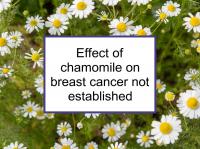Chamomile (Matricaria chamomilla or Matricaria recutita) has been shown to have potent anti-inflammatory activity, as well as moderate antioxidant, antimicrobial and antimutagenic properties. Chamomile contains modest amounts of the flavonoids apigenin, chrysin, luteolin, patuletin, and quercetin.
Chamomile tea, which is brewed from dried chamomile flower heads, has traditionally been used for promoting relaxation. Frequent consumption of chamomile tea has been found to reduce the progress of hyperglycemia and type 2 diabetes complications. Only traces of chamomile essential oil are found in chamomile tea.
Cancer-related effects of eating chamomile
A major Italian population study including 2,569 women with breast cancer found that the risk of breast cancer was reduced for increasing intake of flavones (e.g., apigenin, luteolin, tangeritin) and flavonols (e.g., quercetin, patuletin, myricetin, kaempferol), including those found in chamomile.
Apigenin has been shown to induce apoptosis in human skin, thyroid, gastric, liver, colon, cervical, and prostate cancer cells, and to inhibit migration and invasion of ovarian cancer cells. Apigenin has also been shown to exhibit potent growth-inhibitory effects in HER2+ breast cancer cells. Luteolin has been shown to induce apoptosis in oral cancer calls, to promote cell cycle arrest and apoptosis in colon cancer cells, and to inhibit insulin-like growth factor 1 receptor signaling in prostate cancer cells.
Additional comments
Chamomile essential oil exhibits virucidal activity against genital herpes when applied topically. However, allergic reactions to chamomile in a form of contact dermatitis are not unusual and anaphylactic reactions have also been reported.
Apigenin and other flavonoids may be present in chamomile tea, but the content varies greatly between tea brands. Taking chamomile supplements can interfere with the absorption of non-heme iron (found in non-animal sources such as dry beans and iron supplements). Several studies have found chamomile mouthwash not to be an effective treatment for mouth ulcers arising from chemotherapy.
Chamomile should be bought organic.
Sources of information in this webpage
The information above, which is updated continually as new research becomes available, has been developed based solely on the results of academic studies. Clicking on any of the underlined terms will take you to its tag or webpage, which contain more extensive information.
Note that while we are continually searching for new evidence specifically concerning this food, there is not much interest in it among breast cancer researchers, so few relevant studies are available.
